A Tribute to My Dad
By Clement Wen
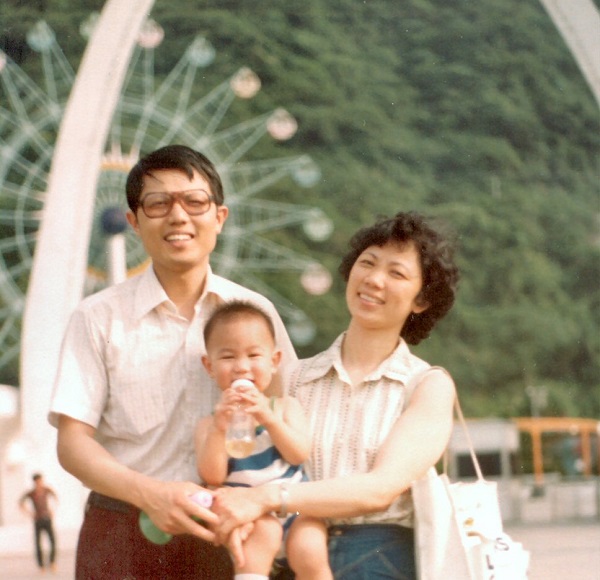
My dad and mom holding me when I was a toddler. 爸媽抱著小時候的我。
When I was five or six years old, I remember asking my dad at the dinner table if we could go swimming. Since it was already dinnertime and, therefore, already near time for the pool to close, my dad joked that if he took me swimming, I would jump into the pool just in time to hear the lifeguard blowing the whistle to tell us all to leave. “You jump in! Whooo!! Time’s up!”, he would say. And though I tried my best to cry so my dad would know my deep dissatisfaction with his refusals, I couldn’t help but uncontrollably laugh as he continued to act out the scene, whistling (“Whoooo!!!”) into the air while saying “Time’s up!” with a playful smile. It’s an early memory that I’ll always treasure of my dad’s disarming, yet delightful, sense of humor.
Around that same time (ca. mid-1980s), I would also often pester my dad and mom about things I wanted them to buy for me. This was during the era when people in America used personal checks to pay for pretty much everything (most notably, at the supermarket). When my dad told me that he didn’t have money to spend on whatever it was I was asking for, I took it upon myself to “explain” to him (i.e., “repetitively whine” to him) that he was speaking nonsense because he could “just write a check.” Little did I know as a five or six year old that I was attempting to demonstrate my naïvely flawed understanding of checking to a man who had earned a PhD in economics from one of America’s top universities and whose job at the World Bank involved traveling to different countries around the world for the purpose of training high-level government officials within those countries about western economic theory. And while my immature stubbornness refused to allow my dad any opportunity to intelligibly respond to my misconceptions of checking and banking (and, later in life, other more important things I should probably have been more open to his knowledge and wisdom about), I have to say that my dad has never once “pulled rank” on me. Rather, from my earliest memories of him till now, he has always been most winsomely patient, kind, gentle, and humble—character traits which are not always found in accomplished persons of his stature and pedigree.

Me looking up to my dad in front of the White House at age six, 1986. 1986年爸爸和我在白宮前,我仰頭看他。
About two months ago, two days before my dad died, I shared my most recent teaching evaluations with him over email. On a scale of five, all of my scores came back as five’s and four’s except for one student who seemed not to think much of one of my classes. My dad wrote back and said “Looks great! Do not mind one or two outcasts” before telling me that, when he was a professor in Taiwan, he was never late for class but would always arrive fifteen minutes early. Yet, from time to time, even he would receive teaching evaluations from one or two students rating him as “sometimes being late.” Reading this made me laugh, as I’m sure he also laughed when receiving such ridiculous feedback. But I especially laughed at my dad’s choice of the word “outcasts” to describe his critics. From now on, it’s the word that I will also be using to describe my own—with humility and within reason, of course! On a more serious note, I recount this story to point out how even my dad’s passing comments could often be laced with much needed life lessons—life lessons whose wisdom I know I will carry with me for the rest of my adult life.
Nevertheless, it is exceedingly difficult to bear the thought that the rest of my adult life will be lived without my dad being with us. A year ago, we could never have imagined the recent turn of events that would lead to his unexpected passing. Though the past couple months have been incredibly hard for me and my family, one of the interesting things about this season (at least for me personally) is that I’ve learned so much about my dad that I never knew before. I didn’t know his “life verse” was Proverbs 3:5-6 [Chinese]. I didn’t know his high school was a militarized boarding school for high academic achievers and that he sang in a choir there that won three national championships in a row (cf. Chinese version of biography). I didn’t know he knew so many people in so many places and that he played a seemingly vital and integral role in almost every social circle and ministry team of which he was a part (cf. KRC and Forevermissed sites). I didn’t know he was “famous” for his drawings (or that he even drew anything at all!).
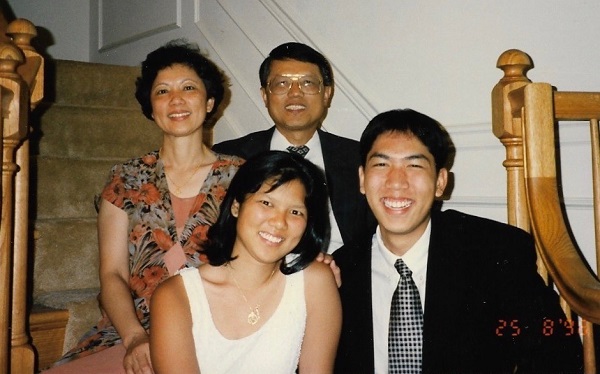
My dad and mom's 25th anniversary celebration, 1996. 1996年爸媽慶祝結婚25週年,我們的全家福。
Most poignant, however, was that I never knew my dad saw his life story as being “a tale of two halves” (à la the popular book by Bob Buford). And yet, when I made this discovery through someone recently sharing a link with me of an autobiographical piece my dad wrote a few years ago, it was as if a veil had been removed from my eyes in a way that all the details about my dad’s life began to make sense like never before. Along such lines, it’s interesting to me that the story of my dad’s “second half” finds its symbolic beginnings in a decision he made to commit his life to full-time Christian service at AFC’s Chinese Missions Conference in 1995. What’s not mentioned in the essay is that my dad’s own father (my grandfather) had passed away shortly before that in the same year. The confluence of these two events makes me wonder if my dad’s recent passing (not to mention the fact that I just turned forty this past November) is somehow meant to symbolize the beginning of my life’s own “second half.”
Before we get to that, though, it’s perhaps worth mentioning that, in retrospect, my dad’s life truly did change a lot when his “second half” became actualized through a move he made in 1996 from the Washington, DC area back “home” to Taiwan to take up a professorship at the then newly-founded National Dong-Hwa University (NDHU) in Hualien. In this regard, when I say “truly did change a lot”, what I’m referring to is a deep transformation in him that was motivated by his faith and actively spurred on by his work, service, and ministry in Taiwan and beyond—so much so that photos of him post-1996 seem (at least to me) to increasingly exude a spiritual maturity and “glorious quality” in him in a manner that his pre-1996 photos don’t. In many ways, there’s a sense in which—in God’s providence—my dad would not have become “complete” (in the sense of Phil. 1:3-6 [Chinese]) had his return to Taiwan to teach not happened. It was during that time that, among other things, he began receiving invitations to preach at local churches, that he served as the faculty sponsor of NDHU’s student Christian fellowship, and that he was part of a small group of professors who teamed up to teach an “Introduction to Christianity” course for formal general education credit at NDHU, Tzu-Chi Buddhist University, and what used to be Hualien Teachers’ College. Even though the course was designed to be academically descriptive rather than explicitly evangelistic, many students came to know Christ through it—some even going on to seminary and entering full-time ministry afterwards.
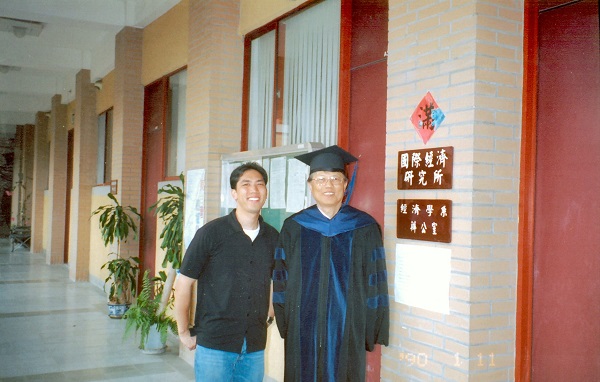
NDHU Graduation in 2003. 2003年東華大學的畢業典禮。
Sadly, this part of my dad’s life was hidden from me for several years as I finished high school and college in the States. But after college, I was invited by a church plant near NDHU to serve as an English ministry intern for two years. It was during that time that I lived with my dad in his university dorm where my witnessing of his private disciplines of waking early to swim, to pray, and to read God’s Word made a deep impression upon my own sense of who he was and what drove him in his daily life. I was further inspired by his hidden acts of service that most would never have seen or ever have heard about. An example of this was that, during the week, he would regularly volunteer to help wipe the pews and sweep and mop the floors at the small local Presbyterian church of which he was a faithful member over the course of his tenure in Hualien. Further, during the first graduation ceremony that I attended at NDHU (in support of my own students there), I saw random student after random student come up to my dad to ask to take a picture with him. What struck me wasn’t so much that there were students who wanted to be in a picture with my dad, but rather, that many who approached him that day had never even taken a class with him (nor did he himself know who they even were)! That was how well-known my dad was on campus. I would later be told by an older friend of mine, who taught in NDHU’s Applied Languages department, that my dad was one of the most highly respected faculty members at the school, and that though my dad was typically quiet during faculty meetings, whenever he did speak, everyone listened.
After my dad’s time at NDHU, I continued to be impressed by all the ways in which he made the most of every opportunity, leveraging all that God had given him, in terms of both worldly and spiritual blessings and experiences, to influence the church and the world for Christ and His Kingdom. Whether it was through his various academic posts at different Taiwanese colleges and universities, or through his annual grading of CFA exams in Charlottesville, Virginia, or through his president-invited position with Taiwan’s Central Bank to help regularly decide the nation’s interest rate, or through his preaching, teaching, writing, and administrative service with Crown Financial Ministries, Kingdom Resources for Christ, Inc., By Streams of Water (a ministry to single-parents), Ambassadors for Christ, and the many other churches and organizations and conferences which invited him to bless their attendees and congregations—my dad lived a full and abundant life that not only espoused the scriptural calling given in Colossians 3:17 [Chinese], but also thoroughly embodied the disposition of Acts 20:24 [Chinese].
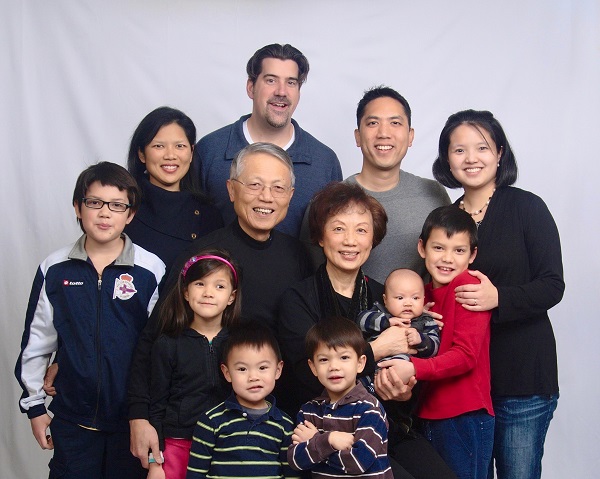
The whole Wen family in 2014. 2014年溫家全家福。
As for me, my dad’s return to Taiwan in 1996 to begin his life’s “second half” also continues to serve as the most significant turning point for my own life to date, but I wouldn’t realize this until years later. Looking back, it was because of his decision to follow the Lord back to Taiwan that I later would also follow the Lord to Taiwan in 2003 to live with my dad and to serve at the aforementioned church plant near NDHU for a couple years. Through my time at that church in Hualien, I met my wife, Tracy, and I also received an inner confirmation from the Lord of my own life’s calling to full-time service and ministry.
As I continue to reflect on who my dad was, I have to say that I’m more in awe of him today than I’ve ever been before in my entire life. I see this growing sense of awe as a glorious gift from God that I believe was meant for me, so that the rest of my life will not only be lived with the intention of adding honor to my dad’s name, but that in doing so, the whole of my life will ultimately give utmost glory and honor to our Heavenly Father.
I think I see things in this new way because I’m beginning to realize that my dad gave me the greatest gift a father could ever give to a son. Through his demonstrable and ever-deepening faith in Jesus Christ, through his loving presence, through his thoughtful and often humorous instruction, through his conscious and unconscious example, through what I’m sure were his many longsuffering prayers, through his seemingly-endless practical and financial support, through the freedom he and my mom gave to me and my sister to pursue God’s callings upon our lives, through his unceasing life-giving encouragement—through all these things and more, I believe my dad’s life has prepared me as best as possible for the “second half” of my own.

With my dad on his final birthday, October 2019. 2019年10月,爸爸慶祝他在世的最後一個生日。
I say “as best as possible” because only time will tell how my own “second half” of life will actually unfold. But in terms of what my dad could do to prepare me, in terms of what my dad could do to inspire me, in terms of what my dad could do to model for me what it looks like to follow Christ and to love and serve others in the name of Jesus Christ with everything he had been given, with every opportunity he was afforded, and with everything that he was—I think he gave me the best preparation he possibly could have as my earthly father, and for that, I’m forever grateful. I hope I’ll be able to do the same for my own kids one day.
There’s so much more I could say, but at the end of the day, I’m grateful for my dad’s life. I’m grateful for his enduring legacy. I’m grateful that, especially over the last ten years, I’ve been able to sense more and more through his words and actions that he’s genuinely proud of me as his son, as I am also of him as my earthly father. In this regard, I’m deeply grateful that before he died, he was able to come in person to Edinburgh last November to watch me graduate from there with my PhD. In the final two weeks of his life, he was also able to watch a YouTube video of me preaching in Chinese for the first time—an event that he, as my proud father, lovingly broadcasted to his entire world via email and social media. (I mention this not as an act of self-promotion, but as an eternally grateful, awe-filled son who was lucky enough to truly feel the pride and joy of his earthly father’s immense love, care, and life-giving affirmation for me. It is precisely this feeling that I hope to also give to my own kids. On a somewhat related note, I should perhaps mention here that I’m also grateful that my dad’s advice to all grandparents was to “shut up and open your wallet” because me, Tracy, and our two kids, Ethan and Micah, have benefitted greatly from him and my mom doing just that for us.)
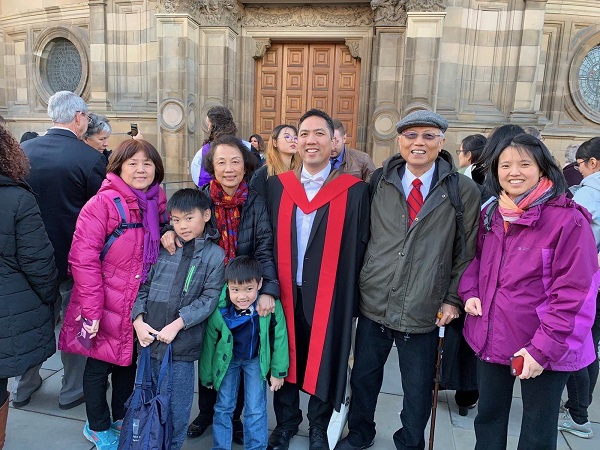
My graduation from Edinburgh, November 2019. 2019年11月,我從愛丁堡大學獲得博士學位的畢業典禮。
I really love my dad. I miss him so much. I’m so grateful to the Lord for him and for his impact and influence upon my life and upon the lives of so many.
On July 7th, almost a month after my dad died, my family and I were making final preparations for his Maryland memorial service that was to take place the next day when we “accidentally” (or perhaps “providentially”) discovered, in his iPhone notes, an additional line to his now well-known “last testimony” that we had never seen before. It was almost as if the Lord knew we needed just one more comforting word, from heaven, so as to let us know that my dad truly is home with Him there. The additional line read: “I am happy to be resting with the Lord.” Though we’re sad that my dad is no longer with us, we gratefully join in his happiness, sure of the hope and promise that, because of our shared relationship with Jesus Christ, we also will one day join him in that most glorious rest.
In the meantime, for all who have been present to me and my family over these last two months, thank you so much for your prayers and support. Thank you also for remembering and celebrating my dad’s amazing and wonderfully full and abundant life with us. I pray that my dad’s life’s story will continue to inspire all of us, spurring us on to greater faith in the Lord Jesus Christ, whom he gave his life to love and to serve, and in whose name alone is found the salvation that we’re not only all meant for, but that we’re also all looking for. Truly, thank you all again! May we all, like my dad, finish the race well [Chinese].
我現在才知道的爸爸
懷念溫英幹教授
文/溫永勖
帶著幽默的智慧
記得五、六歲的時候,一天在晚餐桌上,我問爸爸可不可以去游泳。那時游泳池就快要關了。爸爸以玩笑的口氣說,如果現在帶我去,等我一跳進去池子,救生員馬上吹哨子要我們走:「跳進去!嗶!時間到了!」就算盡了最大努力地哭,讓老爸知道我多不高興,因為他捉狹地繼續說:「嗶!時間到了!」我又忍不住一直笑。
至今我仍珍藏著這段早年記憶,因為顯示了爸爸幽默。
在那個年紀(大概是1980年代中期),我也常常吵著爸媽給我買東西。當時的人在買東西時差不多都用支票,尤其是上超市。爸爸會說他沒錢買我想要的,我覺得我有責任「解釋」(對他來說是「一再抱怨」),他的話太沒道理,他只要「寫張支票」就可以。我哪知道我在「現」對支票天真、不全知識的對象,是一個從全美最頂尖的學校拿到經濟學博士、在世界銀行上班、全球走透透去培訓政府高官的人。
就算抝著不讓他有機會回應我對金融、財務錯誤的觀念(以及長大後應該更接受他的知識和智慧的人生其他重要的事情),他從未拿大帽子壓我。從小到大,他總是耐心、溫柔、恩慈、謙和,這些特質並不見得能在像他這樣地位及成就的人身上找得到。
爸爸去世的兩天前,我發電郵告訴他最近一次的教學評估。所有的學生都給我四分或最高分五分,除了一個學生覺得我的課不怎麼樣。老爸回信:「不錯嘛!不要管那一、兩個異類。」還說他在臺灣當教授時,上課從不遲到,甚至早到15分鐘。但偶而還會從教學評估表裡看到一、兩個學生說他「有時遲到」。我讀著讀著就笑了,我想他拿到這樣無厘頭的評估時也會失笑。尤其是他用「異類」這個詞來形容批評他的人,此後我也會(當然是帶著謙卑和理智地)用這個詞來形容批評我的人。說正經的,即使是爸爸隨口的評論,也都帶上一點人生功課的意味,其中的智慧將使我此生都受益。
豐盛的下半場人生
固然如此,還是很難接受此後爸爸就不會和我們在一起了,一年前,我們誰也沒法想到事情會發展到他突然離世。對我和家人,過去幾個月真的很艱難。然而我個人覺得有意思的是,因此更多認識過去從不知道的父親:我不知道他的「生命經文」是箴言3章5-6節:「你要專心仰賴耶和華,不可倚靠自己的聰明,在你一切所行的路上都要認定祂,祂必指引你的路。」;我不知道他上的高中,是給學習特別優秀的軍隊式寄宿學校,參加的合唱團還連續三年拿到全國冠軍;我不知道他對在這麼多地方的這麼多人,透過這麼多不同的服事團隊,有這麼關鍵的影響力;我不知道他的素描還很「有名」,甚至不知道他會畫畫。
最引我默然沉思的,是未曾知道他看人生為兩個半場,猶如班福德在《人生下半場》(Half Time by Bob Buford)書中所說。從最近有人轉來父親幾年前所寫的自傳文章所發現的點點滴滴,彷彿我眼前的布幔揭開了,爸爸生命中的所有細節,現在看來有條有理。
脈絡中看到爸爸的「下半場」,始於1995年使者差傳大會中,獻身全時間服事。其實在同一年之前不久,爺爺才過世。這讓我思考,父親的離開和我在2019年11月進入不惑之年,會否也象徵我的「下半場」開始?
回首過去,爸爸在1996年離開華盛頓,「回到」臺灣,接受位於花蓮剛成立的東華大學教授職,這樣開始他的「下半場」,此後人生不再一樣。我說的「不一樣」,指的是信仰成為他在臺灣和更廣範圍工作、服務、事奉的動力,這樣深層的變化。從1996年後的照片,看得出他所散放出的屬靈成熟與榮光,是之前沒有的。從許多方面來說,在神的預備下,爸爸是要回臺教書,生命才得以圓滿。從那時起,他接受許多當地教會的講道邀請;擔任東華的基督徒學生團契輔導;和其他基督徒教授在東華、慈濟佛教大學,以及前花蓮師範學院合開《基督教概論》的通識課程。這門課的內容原是學術上的探討,而非擺明著傳福音,然而許多學生因此認識基督,還有人就此上了神學院,成為全時間傳道人。
遺憾的是,在我上高中和大學的那些年,沒能看見爸爸這部分的生活。大學畢業後,東華附近的教會英文部請我去服事兩年。那段日子跟爸爸住在東華的宿舍裡,親見他私底下紀律的生活:早起晨泳、禱告、讀經,讓我印象深刻,進一步了解他的為人和生活的動力。
爸爸在暗處所做、鮮為人知的服事更激勵了我。他固定於週間志願去平日聚會的小長老教會擦座椅、掃地拖地。第一次參加我所服事的學生畢業典禮時,看到一個接一個學生走向老爸,要求合影。讓我驚訝的不是因為學生想跟他一起照相,而是這些來找他的,許多不曾修過他的課,他也不知道他們是否上過他的課。看吧!老爸在校園中挺紅的。後來一位在東華應用語言學系的教授朋友告訴我,爸爸在教職員中備受敬重;一般在會議中他都保持沉默,一旦他開口,每個人都側耳聆聽。
爸爸離開東華的教職後,繼續使用每個機會,應用神所賜屬世或屬靈的一切福氣和經驗,為基督和祂的國度影響教會和世界。透過在臺灣各大學的學術職位;透過每年為理財分析認證考試,去維吉尼亞州的夏洛維爾改考卷;透過受總統聘請參與臺灣中央銀行利息調整的決策;透過講道、教課、寫作、行政,在冠冕理財、神國資源為基督、溪水旁單親、使者協會,以及許許多多請他前往祝福會眾和學員的教會、機構、特會。這一切的一切,看得出爸爸活出充實、豐盛的生命,不僅成為歌羅西書3章17節所說「無論做甚麼,或說話或行事,都要奉主耶穌的名,藉著祂感謝父神」的明證,更躬身實踐使徒行傳20章24節描述的特質:「我卻不以性命為念,也不看為寶貴,只要行完我的路程,成就我從主耶穌所領受的職事,證明神恩惠的福音。」
對我而言,父親1996年回到臺灣開始他人生「下半場」,同時也成為我人生至今重要的轉捩點,雖然這要多年後才曉得。回首往事,爸爸隨著主帶領回到臺灣的決定,讓我也在2003年隨主帶領去了臺灣和他同住兩年。在花蓮教會服事期間,我遇到太太筱筠,也領受主所給我全時間事奉的呼召。
榮耀的傳承
繼續思想父親的為人時,老實說,我從未感到如此的景仰之情。好像是一份從神而來,只給我的榮耀禮物,讓我定意在餘生更增添父親的尊榮,且因此至終我的生命能榮耀天父。
我能以新的眼光看這些事,因為開始領悟爸爸給了父親能給兒子最了不起的禮物。從他所實踐和持續深化對耶穌基督的信仰;從感受到的慈愛;從他思慮週全又常帶幽默的指導;從他有意無意中做出的榜樣;從他恆久忍耐的禱告;從他似乎無止盡的實質與財務資助;從他和媽媽給我和姊姊自由去追尋神對我們的呼召;從他不間段、滿有活力的鼓勵……從這一切的一切加上更多,相信爸爸的生命為我做了盡可能最好的準備,進入人生「下半場」。
我說「盡可能最好」,因為只有時間能評斷我自己的「下半場」將如何開展。爸爸以基督給予他的所有資源和機會,所能為我做的預備,給我的啟發、模範,好讓我跟隨基督,並且關愛、服事他人。他已經盡了地上父親所能地預備我,我因此將永遠感恩,也期盼將來能為自己的孩子這麼做。
還有很多可以說的,總歸一句,我為父親的生命感恩;為他歷久彌新的傳承感恩;也感恩過去十年來,越能從他的言語、行為感受,他真心以我是他兒子為榮。老爸,我也以你是我的父親為榮。我更感恩的是他過世前,能於2019年11月親自出席我的博士畢業典禮。在他人生的最後兩個禮拜,能從YouTube看到我第一次用中文講道。老爸是這麼自豪,他透過電郵和社群媒體,對著他所能接觸的所有人廣播這項成就。我不是自吹自擂,而是以感恩和景仰的兒子身分,知道自己多幸運,真切感受到我地上阿爸廣大的愛、關懷、肯定。我盼望能給予自己的孩子這樣的感受。順帶一句,謝謝爸爸這麼勸告所有的祖父母輩:「嘴巴閉上,錢包打開。」我和太太筱筠、兒子Ethan和Micah,從爸媽為我們所做的受益良多。
2020年7月7日,爸爸過世近一個月後,我和家人正準備著隔天在馬利蘭教會舉行的追思禮拜,意外地(或說是天意)從他手機裡看到他臨別遺言裡之前沒有的一句話。好像主知道我們特別需要額外、來自天上的安慰,讓我們知道爸爸真的已經和祂在一起。
「我很高興能在主裡安息了。」
爸爸不在了,我們很難過;能跟他在應許裡一起快樂、盼望,我們很感恩;確信因著我們共同與耶穌基督的關係,有一天能跟他一起得到最最榮耀的安息。
此刻,對於過去這段時間陪伴我和家人的各位,謝謝您們的禱告和扶持;謝謝您們以這樣的懷念慶祝父親如此奇妙豐盛的生命。祈願父親的生命故事繼續激勵我們,推動我們對主耶穌基督有更大的信心,因為祂付出生命來愛、來服事,且只有藉著祂的名才能得的拯救,是我們生命的意義,也是我們畢生之追尋。
再次謝謝大家。願我們像爸爸一樣,好好跑盡當跑的路。

